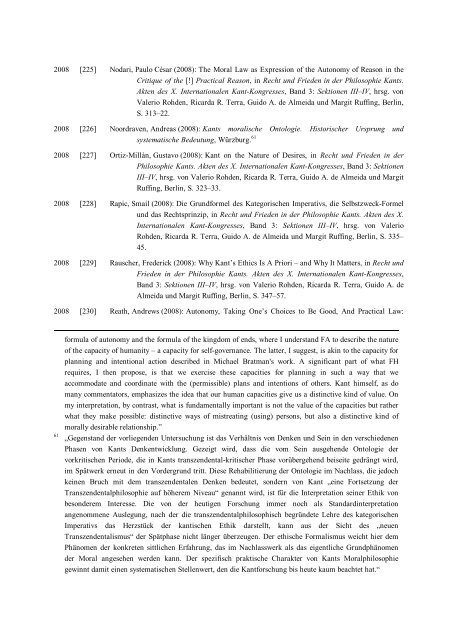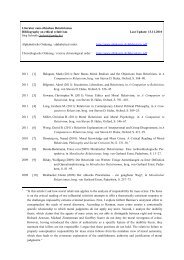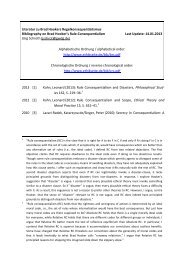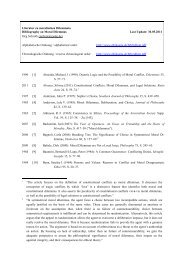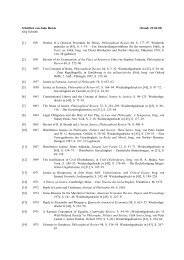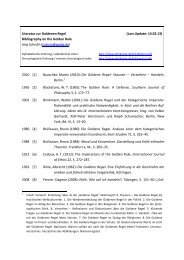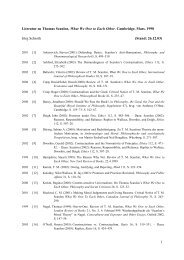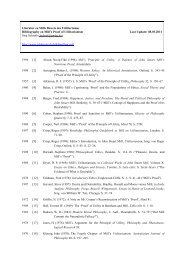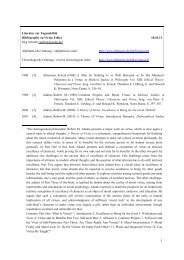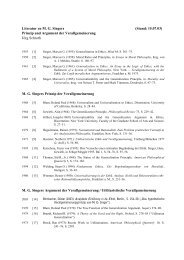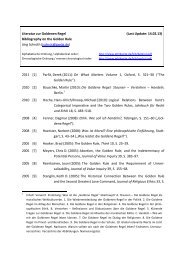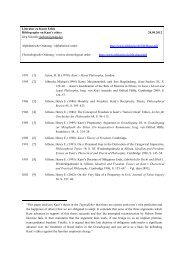Chronologische - Ethikseite
Chronologische - Ethikseite
Chronologische - Ethikseite
Create successful ePaper yourself
Turn your PDF publications into a flip-book with our unique Google optimized e-Paper software.
2008 [225] Nodari, Paulo César (2008): The Moral Law as Expression of the Autonomy of Reason in the<br />
Critique of the [!] Practical Reason, in Recht und Frieden in der Philosophie Kants.<br />
Akten des X. Internationalen Kant-Kongresses, Band 3: Sektionen III–IV, hrsg. von<br />
Valerio Rohden, Ricarda R. Terra, Guido A. de Almeida und Margit Ruffing, Berlin,<br />
S. 313–22.<br />
2008 [226] Noordraven, Andreas (2008): Kants moralische Ontologie. Historischer Ursprung und<br />
systematische Bedeutung, Würzburg. 61<br />
2008 [227] Ortiz-Millán, Gustavo (2008): Kant on the Nature of Desires, in Recht und Frieden in der<br />
Philosophie Kants. Akten des X. Internationalen Kant-Kongresses, Band 3: Sektionen<br />
III–IV, hrsg. von Valerio Rohden, Ricarda R. Terra, Guido A. de Almeida und Margit<br />
Ruffing, Berlin, S. 323–33.<br />
2008 [228] Rapic, Smail (2008): Die Grundformel des Kategorischen Imperativs, die Selbstzweck-Formel<br />
und das Rechtsprinzip, in Recht und Frieden in der Philosophie Kants. Akten des X.<br />
Internationalen Kant-Kongresses, Band 3: Sektionen III–IV, hrsg. von Valerio<br />
Rohden, Ricarda R. Terra, Guido A. de Almeida und Margit Ruffing, Berlin, S. 335–<br />
45.<br />
2008 [229] Rauscher, Frederick (2008): Why Kant’s Ethics Is A Priori – and Why It Matters, in Recht und<br />
Frieden in der Philosophie Kants. Akten des X. Internationalen Kant-Kongresses,<br />
Band 3: Sektionen III–IV, hrsg. von Valerio Rohden, Ricarda R. Terra, Guido A. de<br />
Almeida und Margit Ruffing, Berlin, S. 347–57.<br />
2008 [230] Reath, Andrews (2008): Autonomy, Taking One’s Choices to Be Good, And Practical Law:<br />
formula of autonomy and the formula of the kingdom of ends, where I understand FA to describe the nature<br />
of the capacity of humanity – a capacity for self-governance. The latter, I suggest, is akin to the capacity for<br />
planning and intentional action described in Michael Bratman's work. A significant part of what FH<br />
requires, I then propose, is that we exercise these capacities for planning in such a way that we<br />
accommodate and coordinate with the (permissible) plans and intentions of others. Kant himself, as do<br />
many commentators, emphasizes the idea that our human capacities give us a distinctive kind of value. On<br />
my interpretation, by contrast, what is fundamentally important is not the value of the capacities but rather<br />
what they make possible: distinctive ways of mistreating (using) persons, but also a distinctive kind of<br />
morally desirable relationship.”<br />
61 „Gegenstand der vorliegenden Untersuchung ist das Verhältnis von Denken und Sein in den verschiedenen<br />
Phasen von Kants Denkentwicklung. Gezeigt wird, dass die vom Sein ausgehende Ontologie der<br />
vorkritischen Periode, die in Kants transzendental-kritischer Phase vorübergehend beiseite gedrängt wird,<br />
im Spätwerk erneut in den Vordergrund tritt. Diese Rehabilitierung der Ontologie im Nachlass, die jedoch<br />
keinen Bruch mit dem transzendentalen Denken bedeutet, sondern von Kant „eine Fortsetzung der<br />
Transzendentalphilosophie auf höherem Niveau“ genannt wird, ist für die Interpretation seiner Ethik von<br />
besonderem Interesse. Die von der heutigen Forschung immer noch als Standardinterpretation<br />
angenommene Auslegung, nach der die transzendentalphilosophisch begründete Lehre des kategorischen<br />
Imperativs das Herzstück der kantischen Ethik darstellt, kann aus der Sicht des „neuen<br />
Transzendentalismus“ der Spätphase nicht länger überzeugen. Der ethische Formalismus weicht hier dem<br />
Phänomen der konkreten sittlichen Erfahrung, das im Nachlasswerk als das eigentliche Grundphänomen<br />
der Moral angesehen werden kann. Der spezifisch praktische Charakter von Kants Moralphilosophie<br />
gewinnt damit einen systematischen Stellenwert, den die Kantforschung bis heute kaum beachtet hat.“


